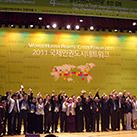개요

배경 및 개요
- 2011국제인권도시네트워크(이하 2011네트워크 행사)는 광주광역시와 5 · 18기념 재단의 공동 이니셔티브로서 인권도시 건설 및 추진 경험을 서로 나누고 배움으로써 역량을 강화하고 국제협력을 도모하는 데에 그 취지를 두고 있습니다. 이번 네트워크 행사는 광주광역시에게 있어 인권도시에 대한 광주의 이니셔티브를 국제 사회에 소개할 뿐만 아니라 다른 도시와 인권 전문가들로부터 광주가 국내 처음으로 시도하는 인권도시의 비전과 전략을 개선하는 방안을 배우는 시의적절한 기회라 할 수 있습니다.
- 2011네트워크 행사는 광주광역시와 외교통산부, 법무부, 국가인권위원회, 유네스코한국위원회 및 유네스코 아 · 태 국제이해교육원(APCEIU)이 후원하고 5 · 18기념재단과 한국인권재단이 주관하는 포럼으로 반기문 유엔사무총장은 특별 메시지를, 네비 필레이 UN 인권최고대표는 특사를 파견하여 특별히 이번 행사를 지원합니다.주로 '인권도시' 대표단과 유엔인권 전문가, 시민단체, 인권관련 NGO, 국내외 학술 관계자 및 언론 관계자 등 국내 · 외 100여명의 참가자들이 참석하여 풍부한 경험과 전문지식을 공유할 예정입니다.
주제 및 '인권도시'의 개념
- 주최 단체는 '도시로부터 시작하는 지구적 인권실현 : 21세기 인권도시의 도전'을 이번 국제회의의 주제로 선정했습니다. 이 주제를 통하여 각 도시와 지방 정부가 인권문제에 대한 국제적 인식 제고에 기여함으로써 실업, 고령화, 외국인과 이민자들에 대한 인종 차별 및 폭력, 빈민가 문제, 도시 격차 문제 등 오늘날 도시들이 직면한 다양한 사회-경제적, 정치적 도전과제의 해결을 하는 데에 있어 중요한 역할을 할 수 있음을 강조하고자 하였습니다. '지구화(글로벌화)+지역화'이라는 표현이 나타내는 바와 같이 이 주제는 오늘날과 같은 세계화된 세상에서 '인권도시'와 지방정부가 국가 정부뿐만 아니라 유엔 인권기구들과 협력하여 시민주도의 전 세계적 인권 향상에 유용한 수단이 될 수 있음을 강조하고 있습니다.
- '인권도시'는 '인권이 근본적 가치이자 준수해야 할 원칙으로서 핵심적인 역할을 하는 도시 차원의 사회 정치적 과정인 동시에 도시공동체'로 정의할 수 있습니다. 현실적인 관점에서 보면 이는 사회 정치적 과정인 동시에 도시공동체'로 정의할 수 있습니다. 현실적인 관점에서 보면 이는 사회적으로 취약하고 소외 받는 소수집단을 비롯하여 모든 시민이 인종, 성별, 피부색, 국적, 민족적 배경, 사회적 지위와 상관없이 모두가 비차별, 참여, 자력화, 투명성, 책임감 등과 같은 인권원칙에 부합하는 삶을 누리며 자신들의 삶에 직접적인 영향을 주는 의사결정 및 정책이행 과정에 전적으로 참여할 수 있다는 것을 의미합니다.
- '인권도시'는 또한 지방 정부, 지방 의회, 시민사회, 민간 부문 및 기타 이해 관계자들이 인권 규준에 입각한 파트너십 정신으로 모든 시민의 삶의 질을 향상시키기 위해 협력하는 '도시 차원에서의 인권 거버넌스'로 이해될 수 있습니다.
광주 및 국내적 맥락과 현황
- '인권도시'라는 개념이 한국에서는 아직 생소하게 받아들여지고 있기는 하지만 최근 지방 정치인, 정책 담당자, 시민단체와 인권단체들이 이를 도시차원에서의 공동체 건서로가 민주 거버넌스 향상의 방안으로 인식하기 시작하면서 이에 대한 관심이 증가하고 있습니다. 뿐만 아니라 지난 몇 년 간 학교 교육, 장애우, 다문화 및 이민자 문제 등 이 주제와 연관된 법안이 각 지방정부 차원에서 제정되기도 했습니다.
- 역사적으로 광주는 국가권력 남용에 저항했던 도시로 잘 알려져 있습니다. 1980년 5월 18일 광주 민주화 운동이 이를 잘 증명해주고 있으며 이는 참여 민주주의와 사회정의를 위한 시민들의 희생에 대한 수많은 증언이 그 역사를 뒷받침해주고 있습니다. 1994년 광주 민주화 운동의 생존자 및 희생자 가족들과 광주 시민들에 의해 설립된 5 · 18 기념재단을 중심으로 광주는 이러한 정신을 국내적으로 또한 국제적으로 확산해왔습니다.
- 5 · 18기념재단은 10년 이상 광주인권상을 수여해오고 있으며 매년 광주아시아 인권학교 운영,국제 인턴십 및 교환프로그램과 광주아시아 포럼 등을 개최 해왔습니다. 뿐만 아니라 성공회대의 아시아 지역 NGO활동가를 대상으로 한 석사과정 프로그램인 '아시아 시민 사회 지도자 과정'에 대한 장학금 지원 및 그 외 아시아의 민주주의와 인권프로젝트들을 지원하고 있습니다.
- 한편 광주시 의회는 2007년 광역 지방자치단체 최초로 '광주시 민주 · 인권 · 평화도시 육성 조례'를 채택했습니다. 이로 인해 시가 인권친화적 정책을 개발하고 실행할 수 있는 법적인 기반이 마련되었습니다.
- 광주는 2010년 7월 제 5대 지방선거를 통해 선출된 강운태 광주광역시장의 주도 하에 '인권사무소'를 설치하였고 현재 '인권지수' 및 '인권영향평가'와 같은 제도를 포함하는 '광주시 인권기본행동계획'을 만들고 있습니다. 최근에는 '광주 인권헌장' 제정위원회가 발족되고 현재 초안을 준비중에 있습니다.
- 따라서 2011네트워크 행사는 이러한 노력을 향상시키고 광주를 국제적 기준에 부합하는 '인권도시'로 육성하기 위한 광주시의 지속적 노력의 자연스러운 일부이며 특히 '인권도시'에 관심이 있는 아시아 도시들 간 국제적 네트워크 추진에 기여할 것으로 기대됩니다.
국제적 맥락과 현황
- 오늘날 '인권도시'는 아시아에서는 아직 새로운 개념으로 인식되고 있지만 유럽 국가 및 미국에서는 상대적으로 좀 더 잘 알려져 있는 개념이라고 할 수 잇습니다. 몇몇 도시 및 지방 정부 간 네트워크와 연합들은 이미 인권을 의제 및 행동계획에 포함시켰으며 그 중에서도 유엔 해비타트가 주관하는 '세계도시포럼', 유네스코가 주관하는 '인종차별반대도시국제연합',세계지방자치단체연합의 '도시에서의 인권을 위한 세계헌장-의제(Global Charter-Agenda for Human Rights in the City)'는 대표적인 인권도시 관련 국제 네트워크로 알려져 있습니다.
- 국제 시민사회 또한 이 '인권도시'의 개념을 적극적으로 수용하고 있습니다. 여러 사회운동과 인권 관련NGO들이 도시 차원에서의 인권 담론과 실행에 정치적차원을 강조하고 부여한 '도시권'이라는 개념을 활용하여 더욱 참여적인 방법으로 '인권도시'운동을 전개하고 있습니다. '인권교육을 위한 대중 운동(PDHRE)'과 같은 인권 관련 NGO단체는 바로 '인권도시'의 개념을 인권 문화 촉진을 위해 필수적인 인권교육 강화의 수단으로 잘 활용한 또 다른 좋은 예입니다.
- '도시에서의 인권'이라는 하향식 접근법과 '도시권(R2C)'이라는 상향식 접근법은 지방정부와 시민사회간의 시너지와 파트너십의 중요성을 잘 보여줍니다. 2011국제회의는 상호보완적이고 서로를 강화하는 두 접근방식 간의 대화의 장을 마련할 것으로 기대됩니다.
의제 및 프로그램 구성
- 2011네트워크 행사는 주로 인권도시를 위한 광주 이니셔티브에 대한 시장의 발표와 개막 키노트 라운드테이블, 인권도시 추진 및 건설 경험을 나누게 될 패널 A와 B, 시민참여와 인권교육을 주제로 한 패널 C와 D로 구성됩니다. 토론과 성찰을 통해 도출된 결과는 폐막식에서 채택하게 될 '광주 인권도시 선언'에 반영될 예정입니다.
- 강운태 광주광역시장이 광주이니셔티브에 대해 직접 발표함으로써 인권도시 육성 비전에 대한 헌신과 정치적 리더십을 보여줄 예정이며, 뒤이어 인권도시대표단의 포럼 전체의 기조와 방향을 제시해 줄 개막 라운드테이블이 진행됩니다.
- 국제회의 주제와 관련하여 '시민참여'와 '인권교육'이 인권도시의 설립과 강화에 있어서 핵심적인 두 가지 과제로 설정되었습니다. 참가자에 제공된 각 세션의 가이드라인 질문과 관련된 자료들을 토대로 논의가 진행될 예정입니다.
- 특히, 인권도시와 관련한 두 가지 국제 기준이라고 할 수 있는 '도시에서의 인권을 위한 세계헌장-의제(2011년 4월)' 및 '도시에 대한 권리에 관한 세계헌장(2005년 9월)'이 인권도시들 간의 국제네트워크 촉진의 구체적 방안으로 포럼 참석자들에게 소개됩니다. 유네스코가 주관하는 '인종차별반대도시국제연합' 또한 이와 같은 맥락에서 소개될 예정입니다.
- 2011네트워크 행사는 국가와 도시의 경계를 넘어 세계적 차원의 인권 문화를 향한 연대와 협력이 강화되는 세계적인 움직임에 함께 하고자 합니다. 광주시는 이것이 '광주정신'을 21세기 국제사회에서 실현시키는 길이라고 확신하고 있으며 이 비전을 적극 추진하고자 합니다.